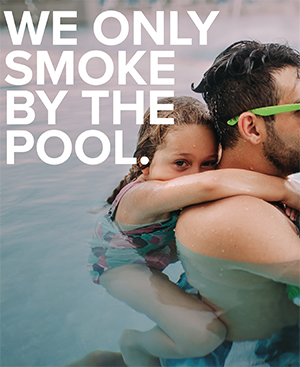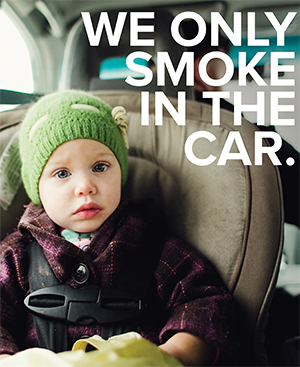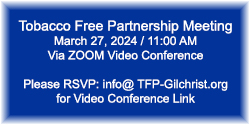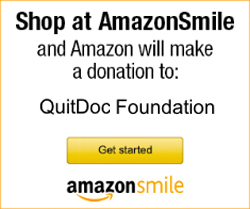News and Events
QuitDoc Foundation Exposes the Risks of Secondhand Smoke
Eighth Annual Tobacco Free Florida Week Aims to Break the Myth that Secondhand Smoke is Harmless
April 28, 2016
May is also Asthma and Allergy Awareness Month, and tobacco smoke is one of the most common asthma triggers. Children with asthma who are exposed to secondhand smoke are likely to experience more frequent and more severe attacks, which can put their lives in danger. In fact, more than 40 percent of children who go to the emergency room for asthma attacks live with smokers.
Residents in Gilchrist County and throughout the state benefit from the Florida Clean Indoor Air Act (FCIAA), which was amended in 2003 to prohibit smoking in indoor workplaces. The Florida Department of Health has a dedicated phone line (1-800-337-3742) where you can report violations to the FCIAA. Floridians can help protect themselves and their families by reporting unlawful smoking, while making the state an even better place to live.
If you smoke, the best thing you can do to protect your loved ones is to quit. Floridians who want to quit smoking are encouraged to use Tobacco Free Florida’s free and proven-effective services. More information is available at tobaccofreeflorida.com.
*Editor’s Note: Tobacco Free Florida’s and QuitDoc Foundation’s assistance with local tobacco free policy efforts are not lobbying, but are services to build awareness and support of jurisdictional voluntary initiatives to improve the health of Floridians.
___________________________________________________________________
About Tobacco Free Florida Week
The eighth annual Tobacco Free Florida Week takes place from May 8-14. Join the conversation on social media using #SHSExposed.
About Tobacco Free Florida
The Florida Department of Health’s Tobacco Free Florida campaign is a statewide cessation and prevention campaign funded by Florida’s tobacco settlement fund. Tobacco users interested in quitting are encouraged to use one of the state’s three ways to quit. Since 2007, more than 137,000 Floridians have successfully quit, using one of these free services. To learn more about Tobacco Free Florida and the state’s free quit resources, visit www.tobaccofreeflorida.com or follow the campaign on Facebook at www.facebook.com/TobaccoFreeFlorida or on Twitter at www.twitter.com/tobaccofreefla.
The department works to protect, promote and improve the health of all people in Florida through integrated state, county and community efforts.
Follow us on Twitter at @HealthyFla and on Facebook. For more information about the Florida Department of Health please visit www.floridahealth.gov.
____________________________________________________________________
REFERENCES:
U.S. Department of Health and Human Services. The Health Consequences of Involuntary Exposure to Tobacco Smoke: A Report of the Surgeon General. Atlanta: U.S. Department of Health and Human Services, Centers for Disease Control and Prevention, Coordinating Center for Health Promotion, National Center for Chronic Disease Prevention and Health Promotion, Office on Smoking and Health, 2006.
U.S. Department of Health and Human Services. How Tobacco Smoke Causes Disease: The Biology and Behavioral Basis for Smoking-Attributable Disease: A Report of the Surgeon General. Atlanta, GA: U.S. Department of Health and Human Services, Centers for Disease Control and Prevention, National Center for Chronic Disease Prevention and Health Promotion, Office on Smoking and Health, 2010.
U.S. Department of Health and Human Services. The Health Consequences of Smoking—50 Years of Progress: A Report of the Surgeon General. Atlanta: U.S. Department of Health and Human Services, Centers for Disease Control and Prevention, National Center for Chronic Disease Prevention and Health Promotion, Office on Smoking and Health, 2014.
Centers for Disease Control and Prevention. Asthma: Common Asthma Triggers [last updated 2012 Aug 20; accessed 2014 May 5
Surgeon General: The Health Consequences of Involuntary Exposure to Tobacco Smoke, A Report of the Surgeon General. U.S. Dept. of Health and Human Services, Centers for Disease Control and Prevention, Atlanta, GA; 2006. ![]()
U.S. Department of Health and Human Services. ―The Health Consequences of Involuntary Exposure to Tobacco Smoke: A Report of the Surgeon General.‖ U.S. Department of Health and Human Services, Centers for Disease Control and Prevention, National Center for Chronic Disease Prevention and Health Promotion, Office on Smoking and Health, 2006.







